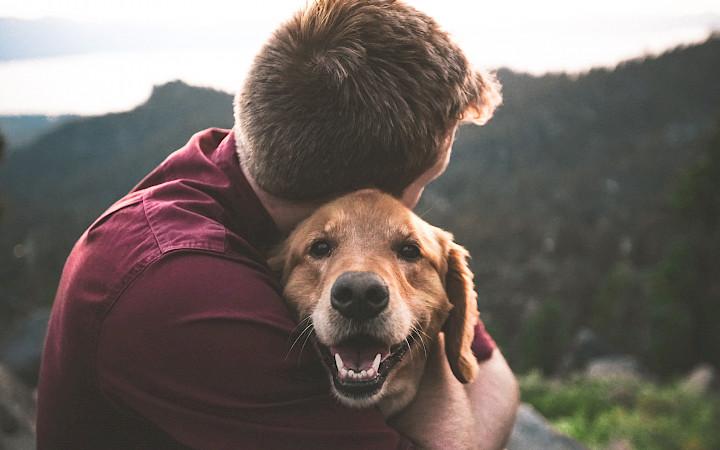
I wrote the other day about my friend Rachael losing her dog, Digby. It is horrific for both Rachael and her husband to feel Digby’s loss every moment of the day. And when death follows a long, extended illness, where the entire organizing principle of your life is caring for an ailing dog, the loss is often exacerbated by the vacuum that follows. If your sleep pattern was disrupted by taking your dog out in the middle of the night, you likely don’t return to sleeping through the night right away. I woke up for months after Gunny died, sometimes reaching out to see if he was still breathing, before remembering that he was dead. Many days, it felt like I had fallen down a well and couldn’t even see light.
As debilitating as my grief was, it was made even worse by watching Bacchus, our other dog, grieve. Bacchus had always been the jock of the family – super athletic and always up for a game of fetch. After Gunny died, he lay down in his bed and hardly moved, looked years older, and followed me all over the house. He stood guard between me and every door, making sure he was protecting me.
Bacchus and Gunny had a relationship that was completely independent of my relationship with them. It was also interdependent – defined roles on who did what between them. Bacchus was in charge of protecting Gunny from other dogs, but Gunny was in charge of protecting the people and deciding when a threat was present. Gunny was also in charge of notifying us all when it was dinner time, walk time, and bed time. We were lost without him. When one family member passes, human or animal, the entire group dynamic shifts and new roles have to be established. That is a process that doesn’t happen overnight, and all family members play a part in redefining the roles.
Of course dogs grieve the loss of other dogs. But they do it as individuals, just like we do. Some humans try to keep themselves busy when they lose a loved one – going to the movie, out to dinner, whatever. Others withdraw, staying in bed or reading a book, or crying for hours at a time. You can’t judge how a person chooses to grieve, and you can’t judge how a dog chooses to grieve. We’re all individuals and we’re all doing the best we can in the face of devastating loss.
That said, there are some common signs of grieving in dogs:
- Withdrawal from people and other pets.
- Lack of appetite.
- Lethargic behavior.
- A change in sleeping pattern.
- Unusually aggressive or destructive behaviors.
- Inappropriate elimination in the house.
- Calling out or vocalizing in an unusual way for the dog who has passed away.
- Searching for the deceased dog around the house.
- Becoming very clingy to family members.
What can you do?
Talk to your dog. Let him/her know that you feel their sadness, too. That you miss your dog, too. That you will get through this together. You can’t fool your dog even if you try. He or she feels your sadness, so talk about it.
Try to keep a routine, but add some new things that might perk your dog up. Go to a new place to walk at the time you usually walk. Schedule a play date. Invent some new games.
Spend as much time as possible with your dog. The constant companionship of his friend is impossible to replace, and going from being part of a pair to an only dog can be really tough.
Remember that your dog is struggling to define his new role. Bacchus relied on Gunny for guidance. When that guiding star was gone, it was a big adjustment for Bacchus to figure out his place in the family. While you may eventually get a new dog, you really need to give your dog time to settle into a new role before getting a new dog.
Lastly, if your dog’s lethargy, inappropriate peeing or pooping, or loss of appetite continues for an extended period of time, please see your vet. While grief is real for your dog, he could need medical attention for other reasons during this time.
Losing a dog is a devastating blow to the whole family, human and non-human alike. Everyone deals with the loss differently, including the other animals in the house. Their grief is as real as yours even if they don’t express it in the same way. Be patient with your dog. Be patient with yourself. It takes time to find a new balance. Give your dog a role in defining it, a choice in how to exist going forward. In the meantime, love each other fiercely and support each other as best you can.